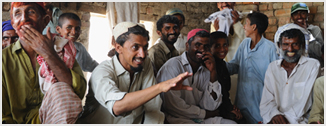
Training local aid workers: redr gives people on the ground the skills to respond
When people’s lives are turned upside down by a major disaster or the effects of conflict, it’s often local aid workers who are called on to respond first.
It is regularly the people of the affected country who work to find shelter, food and medical attention for those in need. redr uk knows that building the skills of local aid workers means disaster-affected communities are better supported in emergencies and better prepared for future crises.
redr uk provides some of the world’s most disaster-prone communities with the skills and support they need to withstand future threats to their lives and livelihoods. But they need to do more. Their "Disaster Resilience Starts Here…" campaign seeks to ensure that communities around the world are ready to withstand the impact of future disasters.
Around the world disasters are becoming more intense and more frequent. In the last 10 years, 2.6 billion people have beeen affected by natural disasters, compared with 1.6 billion the previous decade. 2011 was a record year for the cost of catastrophes to the global economy, totalling US$300 billion, compared with US$226bn in 2010. The recent typhoon in the Philipines has resulted in redr uk receiving a number of requests to respond on-the-ground to the disaster in the Philippines. Aid workers that have arrived in the Philippines have contacted redr uk directly to stress the need to build the capacity of the humanitarian response by training aid workers - particularly Philippine nationals.
By investing in disaster resilience redr uk can tackle this unsustainable rise in costs without compromising vital humanitarian aid. But they can't achieve this in isolation. That's why they're building partnerships with key players from the private sector, academia and governments to achieve both on-the-ground change and a long-term strategic shift towards disaster resilience.

